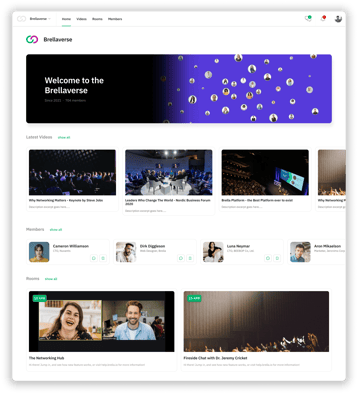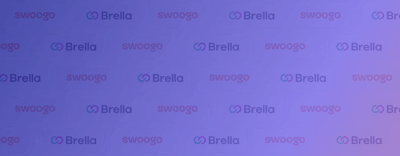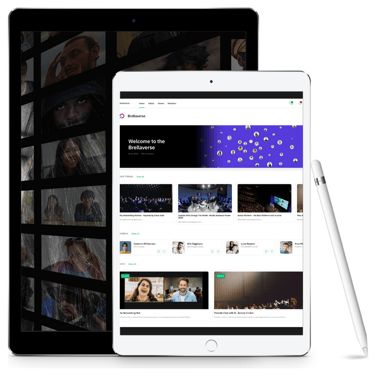Online communities are the hot topic, especially in the event industry, with more and more businesses now realizing the massive potential of owning their own branded online community.
Online communities are a proven way to create a non-stop connection with your audience, and if done right, your online community will yield up to 6,130% ROI. Plus, the return on investment can increase over time up to 7,071% for advanced online communities.
And besides incredible ROI, what are the other key benefits of owning a branded online community?
In a nutshell:
- Increased revenues & customer loyalty
- Thought leadership
- Brand ambassadors
- Immediate feedback and insights on your customers’ needs
- More efficient and timely customer support
- Year-round engagement for your audience (especially for event organizers)
- Massive advantage over competitors
That being said, starting, building, and managing a successful online community isn’t easy, and the task requires a solid action plan and a deep understanding of your member base.
Our goal was to identify exactly what lies at the base of a successful and self-sustaining online community. And what better way than interviewing experienced community managers who’ve done that and succeeded?
During the past months, we had the honor of interviewing eight seasoned community experts who shared all their proven tactics and best practices on how to start, build, and successfully manage your online community.
Now, you can find all their insights in one single practical digital guide. Download your free copy at the link below!
Download your copy of the Community Guide!
Thanks to these experts’ contribution, in this article, we will answer the 5 most asked questions on how to start a thriving online community.
The questions are:
- How do I start my online community?
- How do I measure my online community growth?
- What skills should a community manager have?
- How do I engage my community?
- Why should event organizers start their own online community?
Let’s dive in!
1. How do I start my online community?
Online communities are groups of people who connect and interact with each other around a common interest or purpose in a designated virtual space.
The definition is straightforward, but starting a new online community from zero isn’t as easy a task as it might seem, quite the contrary in fact, and experienced community managers agree.
Emmanuel Nyame is Community Manager at United Nations Foundation and has a 12-year long experience in managing different types of communities.
“Starting a community from scratch is quite difficult if you don’t have the people,” says Emmanuel.
“And once you have the people, it’s not enough to understand the overall group consensus. You need to understand what each member desires as an individual.”
"You need to understand what each member desires as an individual." - Emmanuel Nyame
So, start by identifying not only who’s your target audience but also what thread connects those people. What brings them all together in your space?
It could be an industry, a passion, a business goal, you name it.
“For me, the most successful communities have been created when there is a lack of a ‘home’ for a niche profession,” says RD Whitney, Founder of Community Leaders Institute.
“If you can provide that place, and build trust, this can be a recipe for a successful community.”
After you've established what interest or purpose keeps your members together, it's time to answer another crucial question: what will your online community achieve for your business?
“Before starting an online community, I identify the audience, connect with stakeholders and define the purpose and goal,” says Steven Demoya, Community Manager at Wix.com.
“Additionally, I make sure the community's purpose aligns with the company's vision.”
“The most successful communities have been created when there is a lack of a ‘home’ for a niche profession.” - RD Whitney
Kelly Schott, Manager of Community Programs at Pragmatic Institute agrees. “I firmly believe that a community needs a purpose to be successful and that purpose needs to be understood by the members as well as the organization (or group or person) starting that community.”
Last but not least, there’s another important aspect you should never neglect: make your online community a safe place for each and every single one of your members.
In the words of Hannah Johnson, Community Manager at Rolling Stone Culture Council: “An ideal community is a safe space for people to connect over something they all care about."
2. How do I measure my online community growth?
The groundwork to start your branded online community is done. You’ve identified your target audience, you have a thorough understanding of what keeps them together, and you have a great action plan in place to deliver engaging content that is also aligned with your business goals.
However, there’s one more essential metric you need to define: how will you measure your success and growth?
“I look for metrics that match our overall goals, and make sure to measure the qualitative as well as the quantitative,” says Kelly Schott.
David DeWald, Community Manager at Ciena, has managed multiple communities for nearly 25 years, from open gaming communities to invite-only B2B communities.
“You should be wary of using community growth over time as a health metric,” David says.
RD Whitney reveals that, while the growth of your community can’t be measured accurately with one single metric, a general good indicator of healthy growth is when people keep coming back.
“My personal metric for activity across all my communities is whether or not people are showing up." - RD Whitney
The experts have shared a lot more on how to set the right KPIs and what healthy and sustainable community growth should look like.
Their best tips on how to create the right KPIs and monitor your community’s growth are only one click away.
3. What skills should a community manager have?
Your online community won’t be successful without a knowledgeable community manager at the wheel stirring the conversation in the right direction.
But what are the skills a community manager must have to succeed at the job?
Most of the community experts we interviewed have stressed the importance of soft skills, like empathy and exceptional listening skills.
"Empathy is vital for any community manager,” states David Dewald.
“[Your audience] is going to tell you how they feel, and it won’t always be positive. You need to see things from their perspective - they’re frustrated and trying to solve a problem. So put on your thick skin and help them."
Sam Mackay, former Community Manager at Next Games agrees with this statement. “Soft skills are so important. There are lots of tools to help you understand different facets of your community, but nothing beats being personally involved with your community. So talk with your members, be with them, and listen to what they would like to see."
“Empathy is vital for any community manager.” - David Dewald
Given the dynamic nature of online communities, flexibility and adaptability are also high on the list.
“Community management doesn’t really have a ‘right’ way to do it, because each community will be different and have its own unique needs,” says Hannah Johnson.
“All you need to do is figure out what is best for the community you are managing!”
Hanna manages multiple communities, and by understanding what each community needs, she can provide the best content: “In one community, I share content I find across the social network that relates back to the community topic. In another community, I will ask questions of the members to get them to respond."
On the same note, Emmanuel can’t stress enough the importance of talking and listening to your members: "Understanding the needs of your members is paramount. Whenever possible, actually talk to your members. When I have casual chats with my members, it’s so much easier to understand what they want and need from the community."
“Each community will be different and have its own unique needs.” - Hannah Johnson
All in all, adaptability, empathy, and great listening skills are a must if you want to succeed as a community manager.
Relevant content will evolve over time and you need to understand what’s trending, what resonates with your members, and learn to leverage the best engagement tools.
Speaking of which, let’s move on to the next critical question!
4. How do I engage my community?
Did you know that 55% of community professionals named member engagement as their major pain point?
Yet, engagement is also one of the pillars upon which a thriving online community is built and without it, the whole structure would crumble.
Jason Manion, Director of User Growth & Community Manager at Tallo, has shared all of his proven tactics on fostering attendee engagement.
For instance, Jason has told us that: “When members join, we ask them a lot of demographic questions, so we can send them the most relevant content and information. And because we have this data, I can see what our audience is most interested in, where our largest population is, and so on.”
Jason has also shared his best practices on how to moderate discussions and the tools community managers can leverage to promote a safe and engaging environment.
Read all about them in our Community Guide.
“My goal [at Tallo] has always been to really hone in on what our audience wants.” - Jason Manion
And of course, we couldn’t help but ask what these community managers think of events as engagement tool.
The general consensus was that events are indeed an effective way to skyrocket your community engagement.
“Because an event takes place on a particular date and time creates a sense of FOMO,” says RD Whitney.
“In particular, the potential networking benefit and serendipity of an in-person event creates urgency - it’s going to take place with or without your members, and this helps break through the inertia that can be associated with asynchronous networking.”
This leads us to the last question!
5. Why should event organizers start their own online community?
Events will help you engage and retain your members, but why should event organizers start their own online community?
While conducting our latest research to assess the way event networking has changed since the beginning of the pandemic, we’ve identified major event networking trends for 2022. Among them, was the importance of engaging your audience all year-round.
 Download the full State of Networking report!
Download the full State of Networking report!
Online communities are the most impactful way for event-first organizations to gather their audience in one place and engage them between events.
Think about the opportunity to provide your audience with a central location for discussions, networking, information exchange, and fun until your next event.
The benefits and competitive advantage an online community will give you are massive, and if you want to learn more about it, join us for our Community Launch event on March 31st.
The event will be completely free and together with our special guests, we’re going to show you how to transform your sporadic event-based revenue into a consistent engagement machine!
And if you can’t join us live, don’t worry! Register at the link below anyway and we’ll send you the recording post-event.
 Save your free spot to our exclusive community launch event!
Save your free spot to our exclusive community launch event!
Conclusion
Starting your own branded online community isn’t easy, but we’re to help you!
With the contribution of experienced community managers, in this article, we provided you with practical answers on how to start your own online community.
The questions we answered to are:
- How do I start my online community?
- How do I measure my online community growth?
- What skills should a community manager have?
- How do I engage my community?
- Why should event organizers start their own online community?
Of course, this is nothing but a taste. When it comes to starting your own online community there’s a lot of ground to cover.
Don’t worry, all the proven tips and best practices from these community managers are only one click away.
Download your free copy of the Community Guide and learn everything about building, managing, and scaling your own thriving online community!
Read more
- Virtual events
- Hybrid events
- In-person events
- Event sponsorship
- Event engagement
- Event matchmaking
-
Brella news
-
Brella and Swoogo Partner for Optimized Event Experiences

-
Brella wins the Best Event App in the US & Canada

- START Global partners with Brella for a world-class networking experience
- Brella co-hosts The European Startup Conference to help Ukrainian tech ecosystem
- Next Block Expo partners with Brella for a world-class networking experience
-
- Meet a Brellaneer

.jpg?width=2000&name=Brella_Laptop_hero%20(1).jpg)














